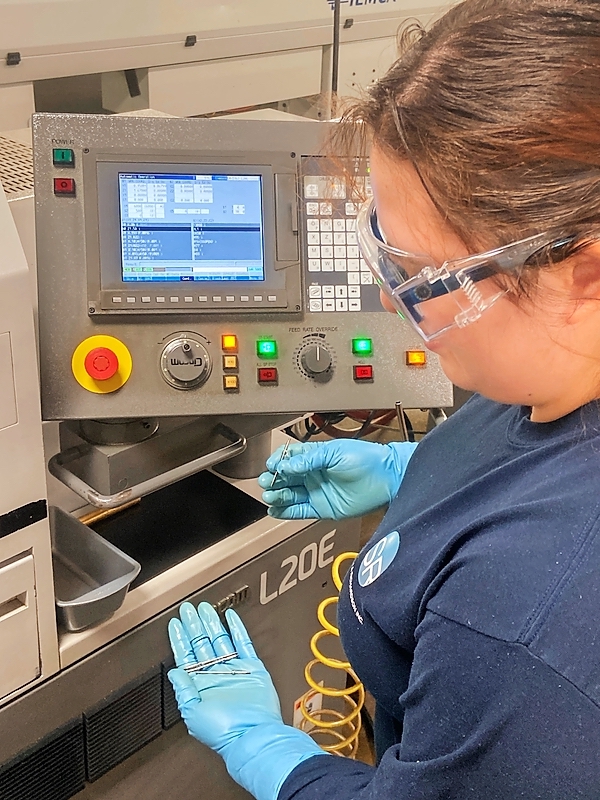Manufacturing Hope
By Naperville Magazine
June/July 2020 View more Shop

By Annemarie Mannion
In a time of pandemic—when health care workers, first responders, and patients need equipment and services to stay alive and healthy—west suburban companies are providing crucial products and services, sometimes at no cost to users.
One of those companies is Plainfield-based TechPoint1, which manufactures a variety of custom products, including computer and lighting systems. When COVID-19 first struck Illinois in March, the company started making something it hadn’t before—transparent face shields and frames. To date, the company has made about 400 shields that have been donated to local hospitals and health care workers, with plans to make between 800 and 900 more.
“We’re blessed in that our business is doing well and we have the skills and equipment to make something that others can’t,” says President Mike Olsen.
The need for protective equipment for healthcare workers hit home for the staff at TechPoint1, some of whom have relatives working in hospitals. Olsen’s wife is a nurse who is currently not practicing. “We’re healthcare-oriented, and I have a particular fondness for what nurses do,” he says.
It costs between $8 and $10 to make each frame and shield. TechPoint1 first started making the shields using thin sheets of plastic but had to switch a thicker version of the same plastic when prices soared. “Our biggest problem is the .06 plastic is so thick that we have to shape it in an oven,” Olsen says.
The company also has had to repair its 3D printers because the material tends to make them break. Despite these challenges, Olsen says there is nothing he’d rather be doing then making the shields, which can be sanitized with heat or alcohol and are re-usable. “I know we’ve prevented people from getting sick because we’ve provided them with these shields,” he says.
Another local company focused on helping people on the frontlines of the pandemic is PetAirapy in St. Charles, which uses ultra-violet germicidal irradiation to clean the air inside ambulances and other emergency vehicles. The company was founded in 2008 by Annette Uda, and normally it uses its equipment to treat indoor air in veterinary offices and other animal care facilities to prevent transmission of upper respiratory infections.
Uda started the company when her pet, a Shih Tzu named Tasha, had allergies that wouldn’t go away and caused her to lose hair and scratch her body. Since COVID-19 is so new, there has not been a chance yet to test against this particular pathogen.
“However, our products have been tested against much tougher pathogens than this,” says Uda. “Our studies show we can achieve a greater than 99 percent kill rate of enveloped, RNA viruses, as well as many of other varieties in our air cleaning systems.”
When COVID-19 began to strain first responders, Uda saw a need to help them sanitize their vehicles and fire houses in a timely way. “Everybody was running out of PPE, and they wanted a quicker turnaround for sanitization,” Uda says.
After first responders have cleaned the surfaces within their ambulances and fire stations, the company invites them to drop by the PetAirapy office for the UV treatment, or company staff members visit their stations to sanitize the air. The process takes about five minutes per vehicle and is free of charge for first responders.
“This isn’t just a publicity stunt,” says Uda. ‘We are really concerned about the health of first responders. Our specialty is air cleaning and reducing viral loads within a facility.”
The company has visited the Mundelein Fire Department twice, which invited other nearby fire departments to bring their vehicles for cleaning. About 45 showed up. “They each had their vehicles sanitized and then were on their way,” says Darren Brents, deputy fire chief in Mundelein. “There’s such peace of mind knowing that both the air and surfaces are clean.”
While Uda is helping first responders maintain a clean environment, Smith & Richardson in Geneva is manufacturing parts for ventilator valves and other medical delivery systems using 12-foot bars of steel.
In late April, President Rich Hoster says the company made 56,000 parts over the prior four weeks—normally it would have made about 2,000 parts during that same time frame. The company, which was founded in 1921 and employs 54 people, had to make some changes to meet the extraordinary demand. “We’ve had to ask customers for relief in some of our deliveries, and subcontracted some of the work,” says Hoster.
Knowing that the parts are going into machines that can aid patients’ breathing and save lives, says Hoster, makes the extra hours and effort being put into making the ventilator parts worthwhile. “I know I, and our employees, are happy to help where we can.”
Photo Courtesy TSmith & Richardson





